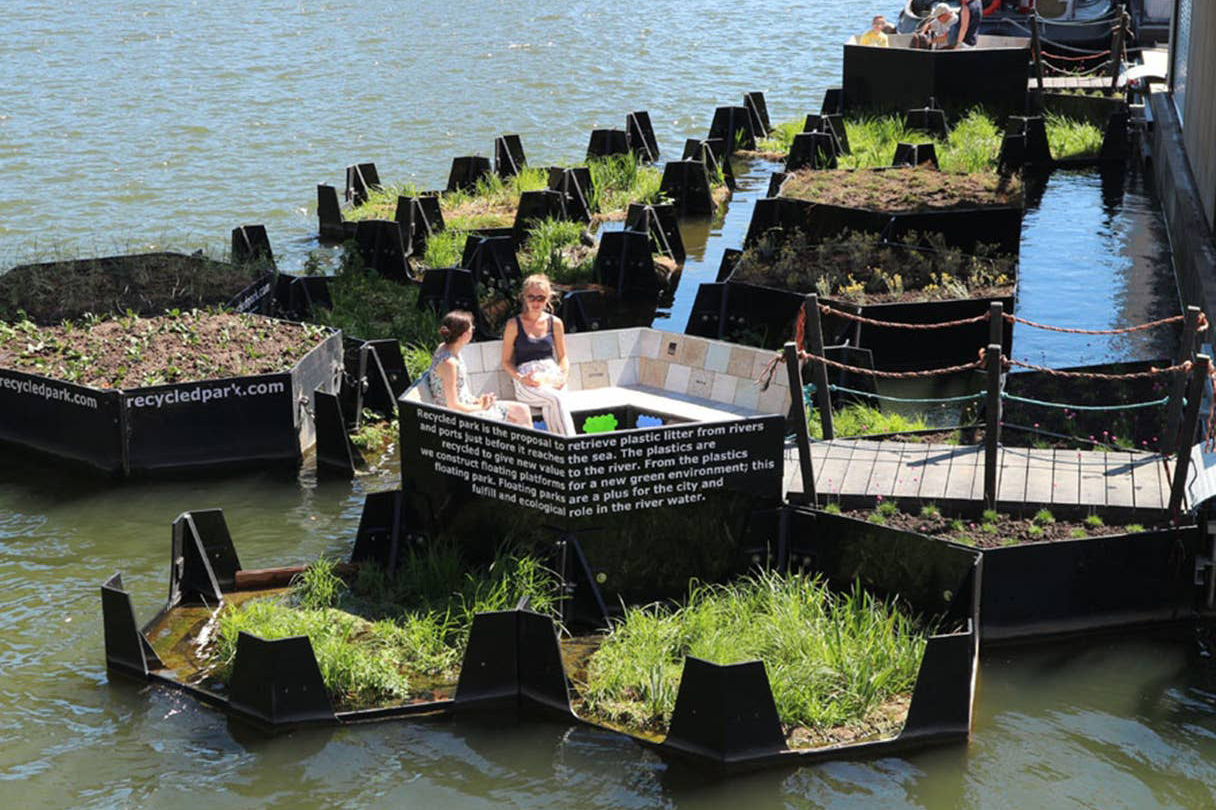From Plastıc Waste To Floatıng Park
Every minute, the plastic waste equivalent of a plastic truck is thrown into the ocean by consumers, but what if it can be caught and removed before drifted out to sea?
One of these solutions called “Recycled Park Project” literally swims. The idea developed over the last five years is to turn plastic waste into islands.
Geri Dönüşümlü Ada (Recycling Island) foundation and Whim Architecture launched the Recycled Park Project in 2014 to collect plastic waste before entering the North Sea on the New Meuse river in Rotterdam. Volunteers sweep the river bank while the three floating waste traps connected to the nets collect waste in the water. The collected plastic waste is converted into hexagonal building blocks used to build an island park floating in the river. The park is full of public plants and benches, but offers a new green living space for people to enjoy in the heart of the city.
In July 2018, a prototype of 140 square meters was opened to the public. It was hoped that five plastic waste traps could be added to the river, creating an island of at least 190 square meters. If the desired yield is captured, this event, which is under investigation in Indonesia, will be able to build similar islands around the world. The Meuse River contains a large amount of plastic waste that occurs after the high fluctuation on its banks. By removing the plastic from the river, the more costly and hard work of removing it from the North Sea is avoided.
However, despite the obvious benefits, the removal of plastic waste from the river is technically prohibited. The wastes in the new Meuse River are legally owned by whoever discarded them. Because EU legislation states that waste may not be abandoned and that waste disposal is a form of abandonment. For this reason, the taking and use of this waste in theory means stealing from the last owner. How unnecessary and ridiculous is the law, right? However, since there is no way of identifying whom the garbage belongs to and there is no way of identifying property, it is socially acceptable for everyone to use plastic waste in rivers.
Common Approach To Plastic Wastes
In order to encourage further reuse and recycling, we need to start accepting waste as our common property. As a societal approach, we promote a sense of responsibility for waste so that the community can benefit from any solution, such as a floating park.
So, how do social approaches work in practice? It must be clearly recognized that waste becomes common ownership. In this example, it could be making people free to buy and use content in specific boxes. For households in the UK, the contents of a trash can belong to the household until it is removed by the local authorities.
It is not appropriate for others, including employees of waste management services, to use during or after collection. In one of the legal cases, an organization’s waste management employees were convicted of stealing goods from warehouses collected during their duties. Once the waste is collected, it becomes the property of the local authority responsible for waste management. Communal bins provide an additional advantage when combined with rules that require content to remain within the community. Local dumps already exist, but most of this waste is currently being taken to another location for storage or exported to other countries.
If at least some residues were left permanently in the communities where they were created, people would be faced with the vast amount of waste they produced and could see the benefits of producing less. Although the existing waste privatization system fails to prevent the pollution crisis, in a common approach, people will have the right to initiate their own creative solutions.
Source: https://www.independent.co.uk/news/science/plastic-pollution-waste-floating-parks-islands-rotterdam-project-netherlands-a8716941.html



